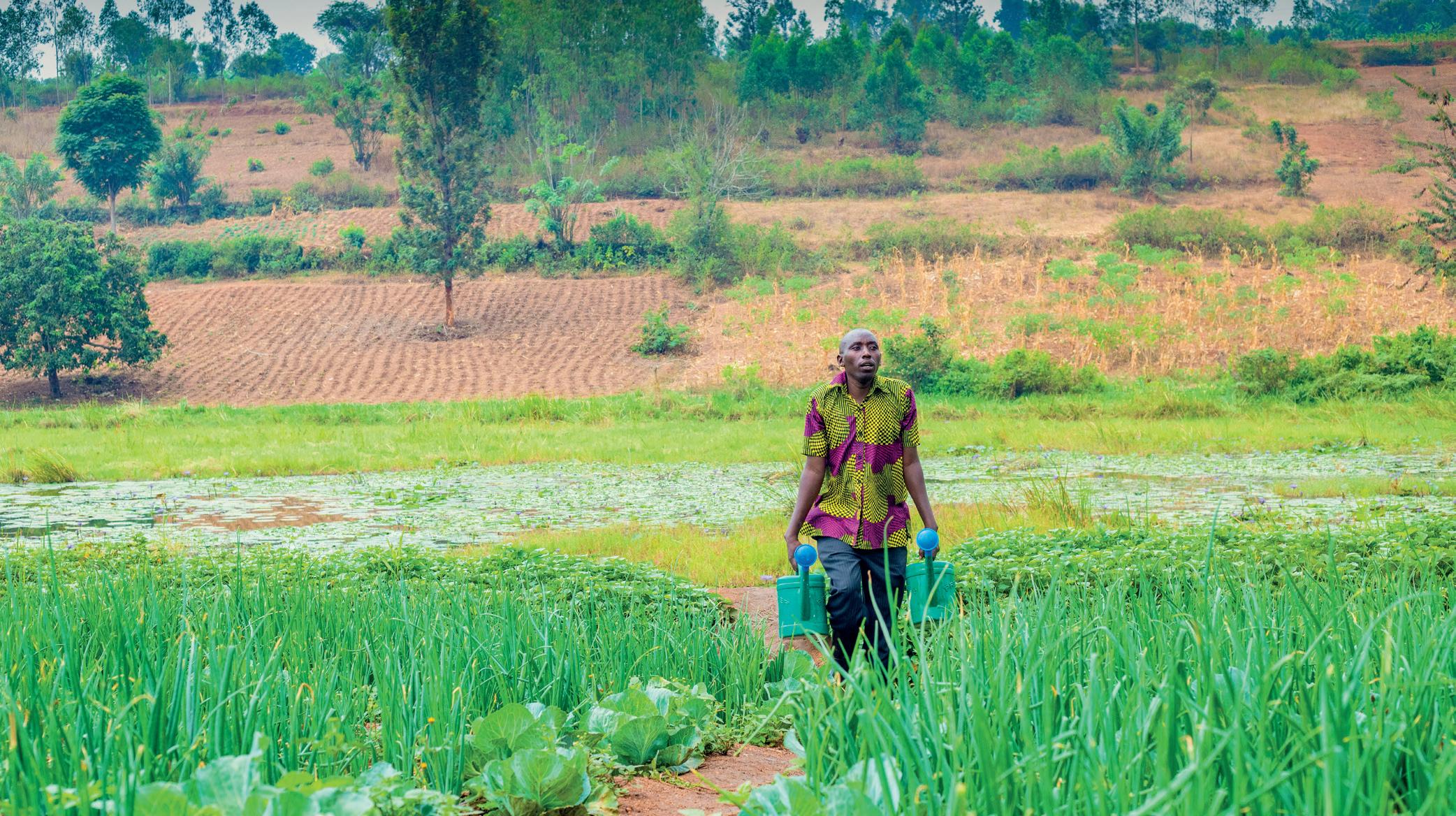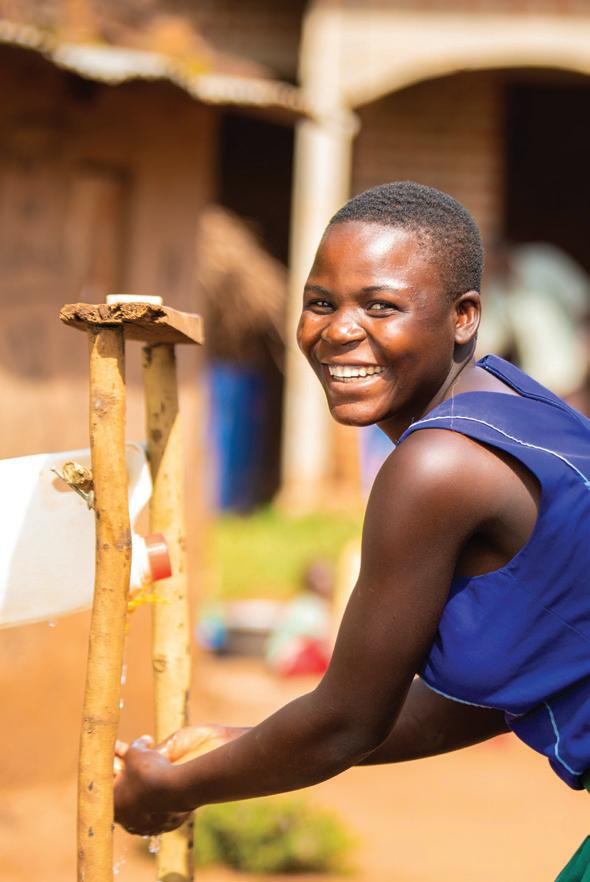
7 minute read
Responding to crisis
Respondingcrisisto
This year a multiple wave of disasters hit sub-Saharan Africa, which compounded to create acute need in the regions of Ethiopia where we work. The families engaged with Ripple Effect have developed resources and resilience that helped them to survive these emergencies. By Aklilu Dogisso, Ethiopia Country Director
Advertisement
Ripple Effect is not a disaster relief organisation. But our work to eliminate poverty ensures that the families we work with have a greater capacity to withstand the economic, environmental or political upheavals they may face. For areas such as Kutaber, in northern Ethiopia, which have been terribly affected by conflict, we have developed an agile hybrid of development and emergency interventions which has enabled us to to respond to urgent need.
Climate crisis
Better outcomes for trained farmers
Dairy for Nutrition and Income (DaNi) project, Wolayita (Southern Nations region) funded by Jersey Overseas Aid
In this past year the effects of the climate crisis in this region, south of Addis Ababa, have been extreme.
In the highlands, farmers can plant barley, maize, peas and horse beans (fava beans). But in these lowland areas only maize or sorghum will grow, and unpredictable rains and drought have devastated crops, communal grazing lands and the supply of fodder. Driving through this region you see maize wilting in the fields and livestock in very poor condition. When you visit families in their homes they have nothing in their kitchens. In the DaNi project we have been training 1,978 families in animal feed preparation and storage. We advise them to keep fewer animals in better condition, and this is a big shift for these communities.
During the first year of the project (2021), Covid restricted our ability to deliver training. Despite this, during the drought:
DaNi farmers’ animals survived better than the livestock of other families.
Our training in the construction of hand-dug wells means that families have water for their livestock and domestic use.
Farmers have introduced short-season crops such as chickpeas and vegetables which can survive the unpredictability of the rains.
Milikias, one of the farmers in the DaNi project, says:
“I received donations of different types of vegetable seeds: carrot, beetroot, cabbage, and I planted them all.
Project results
At the end of year one, 85% of families were confident their farm could meet all their food and income needs.
By the end of Year 2 (2022), earnings had increased 38%
Climate crisis knows no borders: in Rwanda, farmer Gaspard Nzabamwita now carries water from a shrinking lake to irrigate his crops during the dry season.
Conflict
Resilience for families affected by warfare
Developing Business Women, Kutaber (Amhara region) funded by Norad and Baillie Gifford
When fighting between the federal government and Tigray forces extended south to Kutaber in October 2021, people in the project kebeles (neighbourhoods) fled their homes.
Livestock were killed or taken, crops were stolen or withered in the fields, shops and markets were looted, homes were burned and key infrastructure including water points, medical centres and schools were damaged or destroyed. None of the 600 families we worked with were unaffected, but the women involved in our Developing Business Women project had some resources. The aim of this project has been to raise awareness and participation by women in household activities that generate income. Before we started working here in 2019 it was the men who decided everything: which livestock might be bought or sold, and how the money would be used. By September 2021, 98.5% of the women involved in the project had reported “high” involvement in livestock decisions and cash management:
When the men were driven from their homes by the rebel forces, the women had small amounts of savings. They were empowered to make decisions that helped them survive.
When families eventually returned to their homes everything they had built up to that point was gone. Ripple Effect staff were the first NGO personnel to return to the area in February 2022, and the Ethiopian government asked us to provide immediate enhanced support, knowing us to have strong connections to the communities.
Strategic donors such as The Donkey Sanctuary were willing to give us further unrestricted funds, allowing us to respond quickly to the community’s needs.
Project results
80% of self-help groups now have savings and credit schemes 85% started preparing land to plant during the 2022 long rain season 65% have restarted backyard planting with 30% regrowing food crops
Covid
Cost inflation
Covid rates across Ethiopia have declined over the year. At the start of the pandemic vaccines were not widely available, but supplies improved and there was strong government promotion of vaccination. But there was still a lot of hesitancy, and many people remain unvaccinated.
The effects of Covid:
Ministry of Health restrictions on gatherings meant self-help group members could not meet and training was delayed. Procurements and input supplies to all projects were delayed because of movement restrictions.
Almost all our staff at administrative and operational level contracted Covid at one time or another, but fortunately there were no deaths amongst our staff.
The need to provide masks and hand sanitisation to our staff and farmers added to project delivery costs.
Working in the aftermath of the pandemic
Constructing simple tip taps in our project areas helped to combat Covid.

Empowering women and families to become food secure
Empowering Women in Coffee Growing Communities (Bensa) funded by The Starbucks Foundation
Hunger results not just from food shortages, but from people’s inability to pay for food that is available. Global rises in food and oil prices have had a dramatic effect in Ethiopia. Wheat is Ethiopia’s 4th largest import, with 27% of supplies coming from Ukraine in 2020. Food prices rose 66% over this year. In June 2022 the inflation rate in Ethiopia was 37% and 7.2 million people were reported to be facing severe food insecurity. The increased resilience of the families we work alongside has meant:
In projects like Improved Livelihoods in Amhara, they are able to grow their own food and as a result can protect themselves from food price rises by operating outside the market economy. Or they have produce to sell, which enables them to buy other goods, even at inflated prices. When the farmers we work with have produce they can sell locally at reasonable prices it helps to stabilise the local market system, enabling non-farmer essential workers such as teachers and health workers to remain in the area.
As I write, in June 2022, Ethiopia is about to enter the “lean season”, when there is usually less food available. In our current circumstances I am very concerned for my country. I am buoyed by the resilience I have seen from the farmers we work alongside, but it is clear we need more sustainable development to enable families to diversify and protect themselves. That is why it is so important for us to start new projects like the one in Bensa.
The Bensa project began in October 2021 with the aim of making women and their families (55,260 individuals) more food secure in the face of climate change, with a variety of sustainable income sources.
Women’s empowerment and inclusion trainings are raising awareness about gender equality and encouraging women’s leadership.
Our Transformative Household Methodology is challenging the perception of ‘women’s roles’. A greater awareness of women’s rights is ensuring that decisions and workloads are more equally shared. Over three years, sustainable agricultural training in the project will:
Develop families’ food security through crop diversification and rotation, improved animal management and natural pest control.
Mitigate against the climate crisis by restoring biodiversity and soil health.
Raise crop yields, producing a surplus for income. The project is also designed to improve women’s and families’ understanding of enterprise development, and their access to markets and financial services.
Our enterprise training is developing farm businesses which can add value to products, earning higher prices for farmers. Cluster-level Associations are bringing together groups of farmers, enabling them to share market knowledge and leverage their collective bargaining power. Community savings and credit schemes will allow farmers to invest more in their farm businesses.
The effect of crisis-driven inflation on the costs of project delivery
By Rowena Warren, Director of Finance and Resources
During the year, the issue of high inflation across all the countries where we work has been most evident in Ethiopia, where it has risen to over 30%. This meant that not only our project participants but Ripple Effect staff were struggling to afford basic living expenses. We have responded by giving all our staff in Ethiopia a post-conflict salary uplift of 20% to help them with rapidly rising costs. We have made use of forward contracts and carefully controlled our spending to minimise the impact of cost increases on programme delivery. However, we expect the results of high inflation and the weak pound to be more pronounced next year: possibly costing us more than £250,000. We will continue to carefully manage our treasury and seek to mitigate currency risks, holding funds in different currencies and exploring hedging options.

Above: communities helping themselves, with village savings and loans associations like this one in Burundi.








